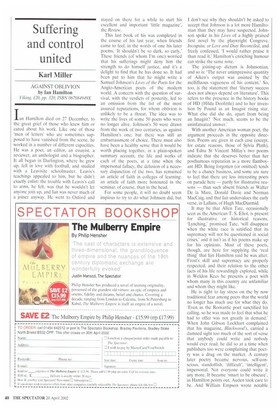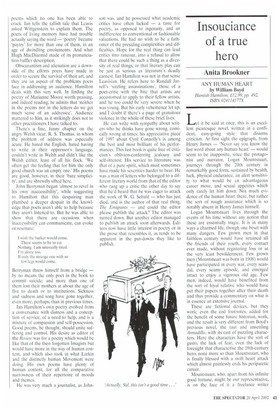Suffering and control united
Karl Miller
AGAINST OBLIVION by Ian Hamilton Viking, £20, pp. 320, ISBN 067084949X Ian Hamilton died on 27 December, to the great grief of those who knew him or cared about his work. Like one of those 'men of letters' who are sometimes supposed to have vanished from the scene, he worked in a number of different capacities. He was a poet, an editor, an essayist, a reviewer, an anthologist and a biographer. It all began in Darlington, where he grew up, fell in love with football, and studied with a Leavisite schoolmaster. Leavis's teachings appealed to him, but he didn't exactly enlist: the trouble with Leavis's call to arms, he felt, was that he wouldn't let anyone join up, and Ian was never much of a joiner anyway. He went to Oxford and stayed on there for a while to start his excellent and important 'little magazine', the Review.
This last book of his was completed in the course of his last year, when friends came to feel, in the words of one his later poems, 'It shouldn't be so dark, so early.' These friends (of whom I'm one) worried that his sufferings might deny him the strength to do himself justice, and it's a delight to find that he has done so. It had been put to him that he might write a Samuel Johnson's Lives of the Poets for the Anglo-American poets of the modern world. A concern with the question of survival, with the verdicts of posterity, led to an omission from the list of the most assured reputations, for whom oblivion is unlikely to be a threat. The idea was to write the lives of some 50 poets who were no longer alive. Johnson's 50 were drawn from the work of two centuries, as against Hamilton's one; but there was still an embarrassment of choice. There must also have been a healthy sense that it would be worth placing together, in a plain-spoken summary account, the life and works of each of the poets, at a time when the impersonal fallacy, the delusion of a necessary disjunction of the two, has remained an article of faith in colleges of learning: an article of faith more honoured in the seminar, of course, than in the head.
For some people, it will no doubt seem impious to try to do what Johnson did, but
I don't see why they shouldn't be asked to accept that Johnson is a lot more Hamiltonian than they may have suspected. Johnson spoke in his Lives of a highly praised first novel by the playwright Congreve, Incognita, or Love and Duty Reconciled, and freely confessed, `I would rather praise it than read it.' Hamilton's enriching humour can strike the same note.
The joining-up dictum is Johnsonian, and so is: `The never unimpressive quantity of Aiken's output was assisted by the mellifluous vagueness of his content.' So, too, is the statement that 'literary success does not always depend on literature'. This refers to the presence in the history books of HD (Hilda Doolittle) and to her invention by Pound as an Imagist rising star. What else did she do, apart from being an Imagist? `Not much, seems to be the uninfatuated answer.'
With another American woman poet, the argument proceeds in the opposite direction. Poems are given in each case (except, for estate reasons, those of Sylvia Plath). and Edna St Vincent Millay's two poems indicate that she deserves better than her posthumous reputation as a more flamboyant HD. Being forgotten (or omitted) tends to be a chancy business, and some are sure to feel that there are less interesting poets on parade here — partly for illustrative reasons — than such absent friends as Walter De la Mare, Donald Davie and Norman MacCaig, and that Ian undervalues the early verse, in Lallans, of Hugh MacDiarmid, It may be that Allen Tate, occasionally seen as the American T. S. Eliot, is present for illustrative or historical reasons. 'Lynching,' promised Tate, 'will disappear when the white race is satisfied that its supremacy will not be questioned in social crises,' and it isn't as if his poems make up for his opinions. Most of these poets, though, are here for supplying the 'real thing' that Ian Hamilton said he was after. Frost's skill and supremacy are properly respected, and their relation to the other facts of his life rewardingly explored, while in Weldon Kees he presents a poet with whom many in this country are unfamiliar and whom they might like.
He is right to lay stress on the by now traditional fear among poets that the world no longer has much use for what they do. 'Even as the Romantic poet sanctified his calling, so he was made to feel that what he had to offer was not greatly in demand.' When John Gibson Lockhart complained that his magazine, Blackwood's, carried a damned sight too much of the sort of verse that anybody could write and nobody would ever read, he did so at a time when publishers too were complaining that poetry was a drug on the market. A century later poetry became nervous, self-conscious, standoffish, 'difficult', 'intelligent', impersonal. Not everyone could write it any more. It became `smart to be obscure', as Hamilton points out. Auden took care to be. And William Empson wrote notable
poems which no one has been able to crack. Ian tells the tallish tale that Leavis asked Wittgenstein to explain them. The poets of living memory have had trouble actually saying the word — 'poetry' became `paytry' for more than one of them, in an age of dwindling emoluments. And what Hugh MacDiarmid made of its pronunciation baffles description.
Obscurantism and alienation are a downside of the efforts poets have made in order to secure the survival of their art, and they are an aspect of the problems poets face in addressing an audience. Hamilton deals with this very well. In finding the poetry of Marianne Moore worth praising, and indeed reading, he admits that 'neither in the poems nor in the letters do we get much sense of an addressee'. Audience mattered to him, as it strikingly does not to other practitioners I have talked to.
There's a fine, funny chapter on the angry Welsh vicar, R. S. Thomas, in whom the problem of address was especially acute. He hated the English, hated having to write in their oppressor's language, couldn't write in Welsh and didn't like the Welsh either, least of all his flock. We often get the feeling that for him the only good church was an empty one.' His poems are good, however, in their 'bare simplicity', and are shrewdly sifted here.
John Berryman began 'almost to revel in his own inaccessibility', while suggesting to Hamilton that this despairing man plumbed a deeper despair in the knowledge that poets aren't able to help because they aren't listened to. But he was able to show that there are occasions when inaccessibility can communicate, can evoke or resonate:
I wish the barker would come.
There seems to be to eat Nothing. I am unusually tired. I'm alone too.
If only the strange one with so few legs would come.
Berryman threw himself from a bridge — by no means the only poet in the book to commit suicide; and more than one of them lost their mothers at about the age of five to death or to institutions. Sickness and sadness and song have gone together, even more, perhaps, than in previous times.
Ian Hamilton's own poetry evolved from a conversance with distress and a conception of service, of a need to help, and is a mixture of compassion and self-possession. Good poems, he thought, should unite suffering and control. His desire as editor of the Review was for a poetry which would be like that of the then forgotten Imagists but would have more in the way of human content, and which also took in what Larkin and the distinctly human Movement were doing. His own poems have plenty of human content, for all the comparative narrowness of their repertoire of moods and themes.
He was very much a journalist, as John
son was, and he possessed what academic critics have often lacked — a taste for poetry, as opposed to ingenuity, and an indifference to conventional or fashionable valuations. He had no wish to be a fathomer of the presiding complexities and difficulties. Hope for the real thing can lead critics into rancour, into a refusal to allow that there could be such a thing as a diversity of real things, or that literary play can be just as serious as literature's deadly earnest, Ian Hamilton was not in that sense Leavisian. He refers here to Randall Jarrell's 'sizzling assassinations', those of a poet-critic with the bite that artists are accustomed to apply to their fellow artists, and he too could be very severe when he was young. But his early vehemence let up, and I doubt if there's a page of gratuitous violence in the whole of these brief lives.
He can write with sympathy about writers who he thinks have gone wrong, comically wrong at times: his appreciative piece of 1997 about Cyril Connolly's is among the best and most brilliant of his performances. This last book is quite free of criticism's oblivion-conferring jealousy and self-interest. His service to literature was that of a pure spirit, which must sometimes have made his severities harder to bear. He was a man of letters who belonged to a different literary world from that of the editor who rang up a critic the other day to say that he'd heard that he was eager to attack the work of W. G. Sebald — who has just died, and is the author of that real thing, The Emigrants — and could the editor please publish the attack? The editor was turned down. But another editor managed to publish an attack soon afterwards. Editors now have little interest in poetry or in the prose that resembles it, as tends to be apparent in the put-downs they like to publish.







































































 Previous page
Previous page